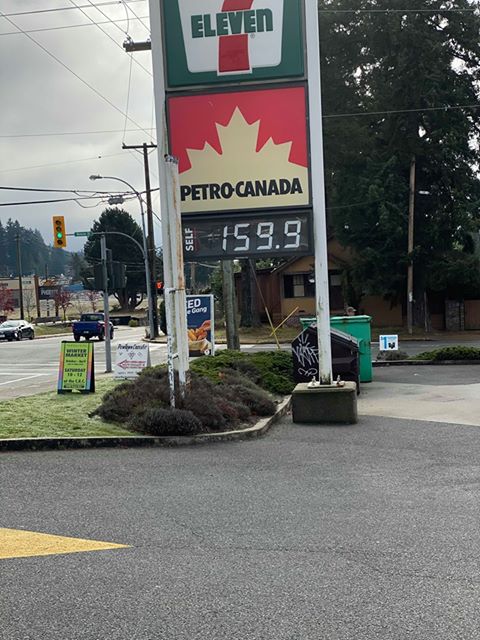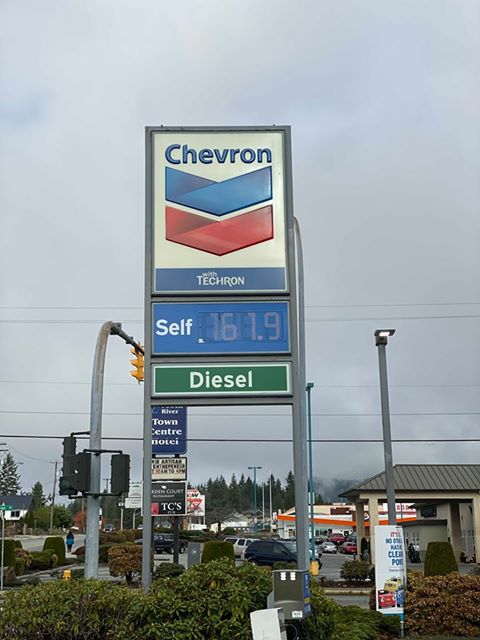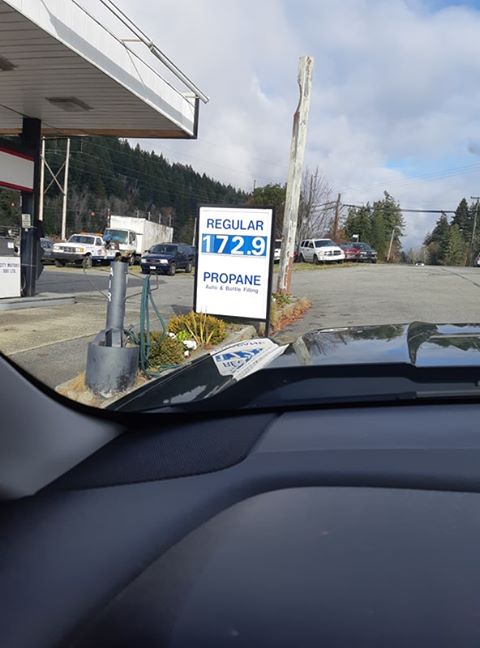While gas prices have fallen to relatively normal levels in Metro Vancouver, communities along B.C.’s Sunshine Coast say they’re getting gouged at the pump.

On Sunday, dozens of protesters in Squamish marched to a local gas station where prices have hovered consistently between $1.45 and $1.50 per litre.
“We think, basically, we’re being cheated,” Christopher DiCorrado said. “We think we may be paying a tourist tax or something like that, because the gas prices in Squamish are almost always more expensive than Vancouver.”

Patricia Carlin, who led the protest group, was even more blunt.
“We’re mad as hell and we’re not going to take it anymore,” she said. “We’re really fed up with hearing from friends and family, commuters in Vancouver, that they’re paying way less for gas than we are. It’s ridiculous.
“I want (the oil and gas companies) to smarten up and stop gouging us.”
While Whistler was seeing similar prices to Squamish on Sunday, other nearby towns like Pemberton were seeing prices more than 10 cents lower a litre.
In Powell River, it’s even worse. For months, residents say prices have stayed consistently above $1.50 per litre.
On Sunday, pictures taken by drivers showed prices between $159.9 and $161.9 per litre. One business, City Motors Ltd. — which was closed Sunday — had a posted price of $172.9 per litre for regular.
Claudio Della Maestra, a lifelong resident of Powell River, said he and others are routinely hopping ferries to Comox on nearby Vancouver Island, where gas is sitting around $1.35 per litre.
“I go there at least once or twice a month, so I try not to buy here at all,” he said. “But for people who can’t afford to go on a ferry, they’re stuck with the price that’s here.”

Get daily National news
Della Maestra said many requests for an explanation from gas station owners and the companies themselves, like Chevron, have gone unanswered.
- Trial starts for man charged in connection with fatal stabbing outside Vancouver Starbucks
- Deaths of Prince Rupert family ruled homicide-suicide, inquest finds
- More than 100 B.C. First Nations urge Eby to uphold DRIPA or risk backslide
- Tumbler Ridge B.C. school shooting: 10 dead including shooter, 27 injured
Another longtime resident, Tom Baker, said the lack of answers is the most frustrating part.
“Nobody seems to be telling us why (the prices are so high),” he said. “They say it’s because we’re isolated. But someone should just tell us why, and I’d like to see what our politicians have to say about it.”
Prices down elsewhere
In Metro Vancouver, prices took a 15-cent-per-litre dip between Thursday and Friday before settling around $1.30 on average. On Sunday, some stations reported prices as low as $1.24.
Petroleum analyst Dan McTeague said Wednesday the drop was due to prices normalizing after a supply crunch in October. McTeague did not return numerous requests for comment on the Sunshine Coast prices this weekend.
Vancouver saw record-high gas prices around $1.70 per litre through most of the spring, with an all-time high of $1.78.9 per litre in April. Other parts of B.C. saw similarly high prices in the spring and summer.

A public inquiry launched by the provincial government in response to the sky-high prices ultimately found no evidence of price gouging or collusion among oil companies but did find an “unexplained” 13-cent difference in Metro Vancouver prices compared to the rest of B.C.
The inquiry did not look at the impact of various provincial taxes that add to the price of gasoline, including the B.C.-wide carbon tax and the TransLink motor fuel tax that’s only applied to Metro Vancouver.
Protesters in Squamish pointed out the town does not have similar transit taxes to justify the high prices there.
“We don’t have any public transit that takes us to Vancouver or takes us to Whistler,” DiCorrado said. “So we’re not sure what’s going on.”
Minister of Jobs, Trade and Technology Bruce Ralston has suggested he may be drafting legislation that would force oil companies to disclose confidential supply and pricing data, but critics have said it would do little to drive prices down in the province.
“People feel like they’re being ripped off at the pump,” Ralston said in a statement. “Drivers in B.C. deserve some transparency and fairness when it comes to gas prices.”
‘Market bear’
Powell River Mayor Dave Formosa — who also owns Top Of The Hill Grocery & Gas Bar, where prices were sitting at the lowest in the city at $1.56 per litre Sunday — said he’s made his own inquiries to why gas prices are so high.
“Basically the answer I got from the oil companies was ‘market bear,'” he said. “It means they can get away with it, whatever the market will bear. There’s no competition, really.
“When you’re isolated like we are, the only way in is by aircraft or by ferry … and they basically can get together, which I’m sure they do, the oil companies, and they keep the prices of these isolated communities high.”
The mayor confirmed fuel is transported to Powell River by barge from Vancouver, but those transport costs alone aren’t enough to justify the price gap with Metro Vancouver.
Formosa said he’s tried to drop his prices to force the larger companies operating in town to do the same, but it hasn’t worked. Because he’s at the top of Wildwood Hill — more than 10 minutes north of City Hall — it’s still easier for drivers to fill up elsewhere.
“It’s frustrating that we’re being held ransom,” he said. “It’s not just now, it’s always been like this.”

Requests for comment from Chevron, Petro Canada and other companies went unanswered Sunday.
Formosa’s comments don’t help explain Squamish’s predicament. Until prices start to go down, protesters said they plan to continue putting pressure on the oil companies and the government.
“Maybe if more people speak out about it or are aware of it, maybe someone can come forward with an explanation,” Suzanne Clarke said. “If you don’t understand the problem, then you can’t solve the problem.”














Comments
Want to discuss? Please read our Commenting Policy first.